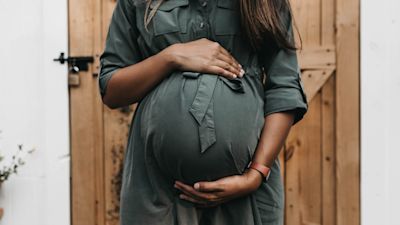Covid: Study launched to find best gap between coronavirus vaccines for pregnant women

Researchers are working towards determining what the best gap is between coronavirus vaccine doses for pregnant women, in hopes that the findings will reassure hesitant expectant mothers on the safety of the jabs.
In a new study, scientists are aiming to recruit more than 600 pregnant women for a trial which will monitor the vaccine’s effectiveness and follow the development of children up to one year old.
The launch comes less than a week after research revealed the vast majority of pregnant women admitted to hospital with Covid-19 are unvaccinated.
England’s chief midwife has written to GPs and fellow midwives across the country urging them to encourage expectant mothers to get a jab.
Those behind this latest Preg-CoV trial said while there are currently no safety concerns when it comes to pregnant women having Covid-19 jabs, they hope it will give expectant mothers and those caring for them “the highest quality of data about these vaccines”.
Almost 52,000 pregnant women in England have been vaccinated to date – with no safety concerns reported.
The trial – the UK’s largest investigating the best gap between first and second doses for pregnant women – involves £7.5 million of government funding and is being led by St George’s, University of London.
Professor Paul Heath, chief investigator and professor of paediatric infectious diseases at St George’s, said: “The coverage (uptake) of vaccination in pregnancy at the moment is disappointing, it’s low, less than a third.
“I suspect that one of the reasons for that is that they do not feel confident enough about vaccination. Perhaps participating in a trial will give them that confidence”.
He said he hoped a lesson to be learned from this pandemic is “the need for including pregnant women in vaccine trials at an earlier stage” and acknowledged such a trial “could have started six months ago”.
Research published last week revealed that more than 99% of pregnant women admitted to hospital with Covid-19 are unvaccinated.
ITV News spoke to a mother who chose not to get the vaccine while pregnant, but said she nearly lost her life to Covid-19 and is urging other pregnant mums to get jabbed.
Professor Asma Khalil, lead obstetrician for the trial and professor of obstetrics and maternal foetal medicine at St George’s, said the most common question from pregnant women is whether they should get the vaccine.
She said while there is data showing no safety concerns following vaccination in pregnant women, there remains a worry among patients because pregnant women were not included in initial Covid-19 vaccine trials.
She said: “The data we have are good, and provide some safety reassurance but what we want to aspire to is the top quality, the high quality data from randomised controlled trials which this trial will provide”.
Vaccines involved initially will be the Pfizer/BioNTech and the Moderna vaccine but other new vaccines will be included as they are approved in the future.
Women aged 18 to 44 will be recruited from some 15 sites across England if they are between 13 and 34 weeks gestation at the time of vaccination.
They will randomly receive one of the vaccines either at a four to six week dosing gap or the longer eight to 12 week dosing gap.
The first trial results, looking at any adverse events following a first dose, should be available towards the end of the year, while immune response results are expected in the first quarter of next year.
Dr Pat O’Brien, vice president at the Royal College of Obstetricians and Gynaecologists, said the findings of the study are likely to be relevant “for many years to come”.
He said: “This is an important study. We feel comfortable with the safety of these vaccines. What we want to understand now is how to fine-tune them, to understand better how they work. What’s the optimal way of giving them?
“Do they work as well in pregnant women as in other people? Bear in mind this pandemic is likely to become endemic, this is likely to be ongoing. So I suspect that the findings from this trial will be relevant to us, to pregnant women for many years to come”.
Vaccines minister Nadhim Zahawi said: “Pregnant women are more likely to get seriously ill from Covid-19 and we know that vaccines are safe for them and make a huge difference – in fact no pregnant woman with two jabs has required hospitalisation with Covid-19.
“This government-backed trial will provide more data about how we can best protect pregnant women and their babies, and we can use this evidence to inform future vaccination programmes.
“I encourage anyone who is pregnant and eligible to sign up and contribute to research that will save lives for years to come”.
Last week researchers at Oxford University described findings of their work as “concerning”, saying that one in 10 pregnant women admitted to hospital with symptoms of Covid-19 often require intensive care.
Marian Knight, professor of maternal and child population health at the Nuffield Department of Population Health, University of Oxford, and chief investigator of the study, said pregnant women can be “reassured” about the safety of the vaccines and that antibodies will be passed to their babies.
Listen to our coronavirus podcast: